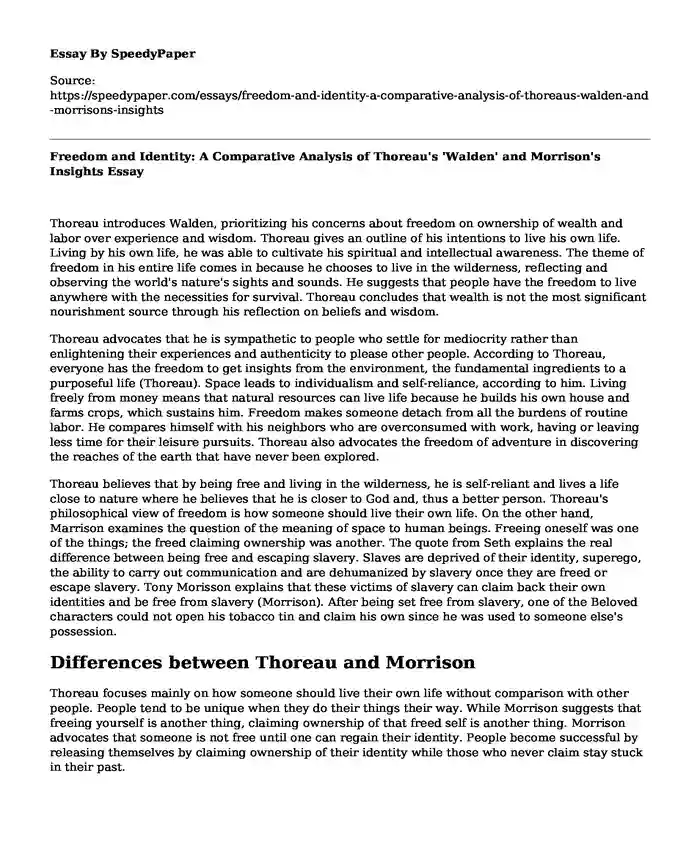Thoreau introduces Walden, prioritizing his concerns about freedom on ownership of wealth and labor over experience and wisdom. Thoreau gives an outline of his intentions to live his own life. Living by his own life, he was able to cultivate his spiritual and intellectual awareness. The theme of freedom in his entire life comes in because he chooses to live in the wilderness, reflecting and observing the world's nature's sights and sounds. He suggests that people have the freedom to live anywhere with the necessities for survival. Thoreau concludes that wealth is not the most significant nourishment source through his reflection on beliefs and wisdom.
Thoreau advocates that he is sympathetic to people who settle for mediocrity rather than enlightening their experiences and authenticity to please other people. According to Thoreau, everyone has the freedom to get insights from the environment, the fundamental ingredients to a purposeful life (Thoreau). Space leads to individualism and self-reliance, according to him. Living freely from money means that natural resources can live life because he builds his own house and farms crops, which sustains him. Freedom makes someone detach from all the burdens of routine labor. He compares himself with his neighbors who are overconsumed with work, having or leaving less time for their leisure pursuits. Thoreau also advocates the freedom of adventure in discovering the reaches of the earth that have never been explored.
Thoreau believes that by being free and living in the wilderness, he is self-reliant and lives a life close to nature where he believes that he is closer to God and, thus a better person. Thoreau's philosophical view of freedom is how someone should live their own life. On the other hand, Marrison examines the question of the meaning of space to human beings. Freeing oneself was one of the things; the freed claiming ownership was another. The quote from Seth explains the real difference between being free and escaping slavery. Slaves are deprived of their identity, superego, the ability to carry out communication and are dehumanized by slavery once they are freed or escape slavery. Tony Morisson explains that these victims of slavery can claim back their own identities and be free from slavery (Morrison). After being set free from slavery, one of the Beloved characters could not open his tobacco tin and claim his own since he was used to someone else's possession.
Differences between Thoreau and Morrison
Thoreau focuses mainly on how someone should live their own life without comparison with other people. People tend to be unique when they do their things their way. While Morrison suggests that freeing yourself is another thing, claiming ownership of that freed self is another thing. Morrison advocates that someone is not free until one can regain their identity. People become successful by releasing themselves by claiming ownership of their identity while those who never claim stay stuck in their past.
Thoreau and Morrison draw lines because Horeau focuses on freedom from nature, while Morrison focuses on freedom from slavery.
Another difference between the two is Thoreau focuses on the freedom of utilizing natural resources to become materialistic. At the same time, Morrison suggests that retaining someone's identity is a form of success by gaining adversity and regaining their lives.
Similarities
The two advocates about discovering someone's identity and security make someone move on and live the rest of their lives to their fullest. The two also advocate that a successful life is dependent on being oneself.
Work Cited
Morrison, Toni. "Beloved. 1987." New York: Plume 252 (1988). http://www.amerlit.com/novels/ANALYSIS%20Morrison,%20Toni%20Beloved%20(1987)%20review%20by%20Margaret%20Atwood.pdfThoreau, Henry David. Walden. Yale University Press, 2006. https://books.google.com/books?hl=en&lr=&id=v-Qghe4gyvMC&oi=fnd&pg=PR7&dq=walden+by+thoreau&ots=yuksn6wT2M&sig=lU0qKRfBmK1lKlN_13xMXT7xUbs
Cite this page
Freedom and Identity: A Comparative Analysis of Thoreau's 'Walden' and Morrison's Insights. (2024, Jan 30). Retrieved from https://speedypaper.com/essays/freedom-and-identity-a-comparative-analysis-of-thoreaus-walden-and-morrisons-insights
Request Removal
If you are the original author of this essay and no longer wish to have it published on the SpeedyPaper website, please click below to request its removal:
- Definition of Gender Roles Essay Sample
- Forms Women's Anger Took During the Dual Revolution - Essay Example
- Murder Case Investigation - Paper Example
- Introduction to Terrorism and Homeland Security, Essay Sample for Free
- Free Essay Sample: Theories About Feminism
- Essay Example - A Personal Conflict
- Free Essay - Multicultural Aspects and Therapies Related to Schizophrenia
Popular categories





